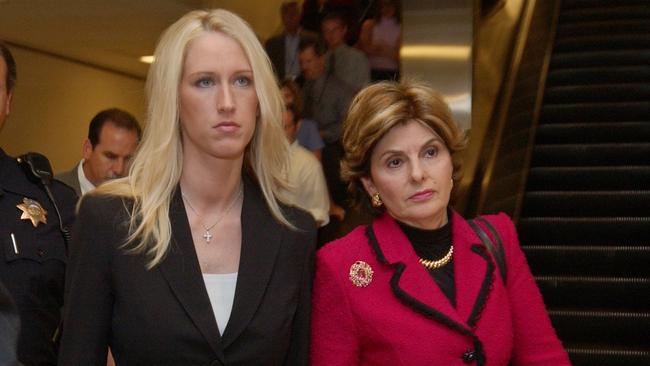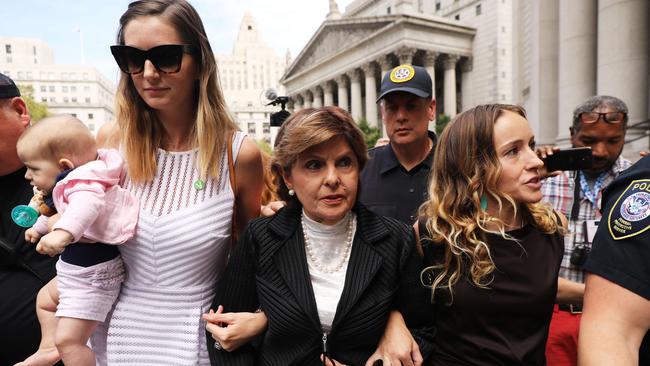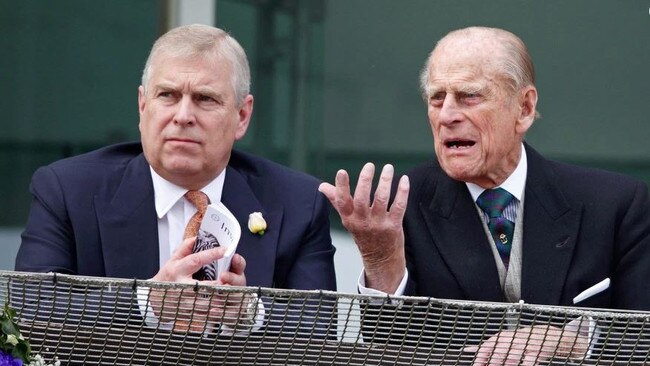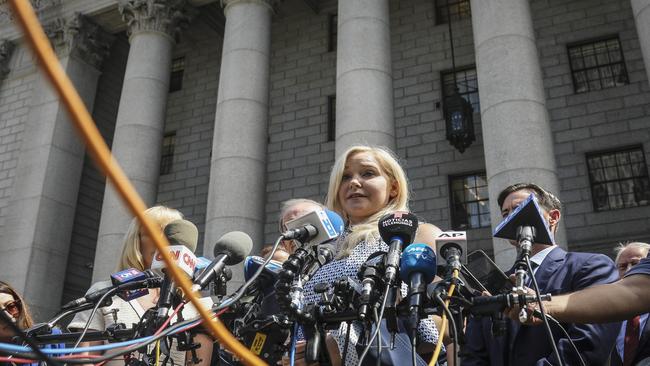With Gloria Allred on his case, Prince Andrew should be worried
From Tiger Woods to OJ Simpson, humbling powerful men is Gloria Allred’s bread and butter. Now, Prince Andrew is on her hook.
Within minutes of meeting perhaps America’s most famous lawyer, I’ve discovered that her patience with Prince Andrew is paper-thin and she doesn’t give a fig about his shredded reputation. Gloria Allred is adamant that the Duke of York should stop dilly-dallying and speak to American investigators about his former friend Jeffrey Epstein, the convicted sex offender who trafficked and abused countless underage girls.
“Prince Andrew has taken the decision that he’s done nothing wrong, so why would he hesitate to speak to law enforcement? Is he afraid he might incriminate himself?” says Allred, her voice raised over the lunchtime din at a Manhattan brasserie. “What does he have to fear?”
The self-described feminist lawyer is representing five of Epstein’s alleged victims, who have launched civil lawsuits, including damages from his $577m ($AU840m) estate, after the disgraced financier killed himself in jail in August. Meanwhile, in a separate criminal case, investigators in New York are working to unravel the multimillionaire’s sprawling sex-trafficking operation.
Last week, in an effort to move the case on, Allred, 78, sent the prince a letter requesting that he provide “sworn testimony” to the FBI, as well as a “sworn deposition” in one of the civil cases.

She wrote on behalf of her client, “Jane Doe 15”, who has described being viciously sexually assaulted by Epstein at his ranch in New Mexico when she was 15. Later there was an attempt to lure her to Epstein’s home in the Virgin Islands - with a promise of meeting the prince allegedly dangled as a bait.
In the two-page letter, Allred told the prince: “Mr Epstein’s representative conveyed to Jane Doe 15 that Mr Epstein was close to you, that you would be among the guests on the private island, and that she would have an opportunity to meet you. In other words, your prestige and reputation were directly touted in his attempts to engage in further harm.”
The teenager refused the invitation to the Virgin Islands, did not meet the prince and never saw Epstein again.
As a royal, says Allred, Andrew should set an example: “It’s not enough to express some sort of sympathy to the victims. It’s not just about closure for them, it’s about justice.”
She watched last month’s BBC interview in which Andrew, 59, said he had no recollection of Virginia Giuffre (nee Roberts), who claims Epstein and the socialite Ghislaine Maxwell trafficked her as a teenager to have sex with the prince.
What irked Allred was Andrew’s suggestion that he would speak to the FBI if advised to do so by his lawyers. “Most people don’t need to speak to their attorneys to decide if they should provide information that might be relevant to criminal prosecution and which could help bring justice to victims.”
Citing client confidentiality, she refuses to reveal whether any of the other four women she is working with came into contact with the duke when he was staying at Epstein’s mansion in Manhattan, his home in Florida or his privately owned atoll in the Virgin Islands.
Meanwhile, Lisa Bloom, Allred’s daughter and another high-profile lawyer, is flying two witnesses - who claim they saw Andrew with Giuffre at Tramp nightclub in London - across the Atlantic to speak to the FBI.

Giuffre says she was forced to have sex with Andrew after dancing at Tramp, as well as on two later occasions. The duke has repeatedly denied the allegations. “Tempus fugit! The clock is ticking,” says Allred. “He shouldn’t be trying to decide how what he knows helps or hurts anybody, he should just provide the facts.”
Allred speaks and eats quickly. Renowned for conducting dramatic press conferences, she is a divisive figure: to fans, a fearless crusader crushing powerful men ("It’s a Davina versus Goliath battle,” she quips); to her enemies, an ambulance-chasing attention-seeker.
Love her or loathe her, she has fought an extraordinary list of men: Tiger Woods, OJ Simpson, Michael Jackson, Roman Polanski, Eddie Murphy . . .
The 5ft 2in dynamo has also taken on Donald Trump. In 2012 she was hired by Jenna Talackova, a transgender model, who had been barred from the Miss Universe beauty pageant that Trump owned at the time because she wasn’t a “naturally born” woman. Trump caved in and Talackova competed. Years later Allred represented women who accused Trump of sexual misconduct. In the #MeToo era she is busier than ever, representing women who have accused Bill Cosby, Harvey Weinstein and the singer R Kelly.

She is fresh from victory against a British-Greek media billionaire accused of sexual assault by an employee. A Los Angeles court ordered Alki David to pay $58m to Allred’s client. She believes it could be the largest amount one individual has won in a sexual harassment case against an employer.
Next month she will be back in Manhattan for Weinstein’s long-delayed and feverishly anticipated rape and sexual assault trial.
She is representing two of his alleged victims, who will give evidence. “It’ll be difficult to be on the witness stand of the highest-profile criminal case in the country,” she says, refusing to count her chickens about the outcome.
Last week Weinstein reportedly reached a tentative $25m settlement agreement with dozens of women who accused him of sexual misconduct. Under the controversial agreement, which would resolve almost all of his civil battles, the producer wouldn’t have to admit fault and insurers representing his former studio, the Weinstein Company, would stump up the money.
Allred has recently come under fire, accused of being part of the reason Weinstein was able to behave as he did for so long. Megan Twohey and Jodi Kantor, the New York Times reporters who broke the story about the Hollywood producer, have accused Allred of putting pressure on her clients to accept secret settlements rather than speaking out in court. They maintain this practice allows predators to slip under the radar and continue their reigns of torment.
Allred is having none of it, arguing that journalists don’t understand the system and her clients have a right to pursue justice privately: “I’m tired of people attacking a woman’s right to choose to enter into a voluntary, confidential settlement. That choice shouldn’t be taken away by politicians or by reporters who don’t like the fact that they can’t know.”
Allred is seasoned at shrugging off criticism, quoting Gone with the Wind: “Frankly, my dear, I don’t give a damn.” If the attacks are personal, she knows she’s on top: “They should just haul up the white flag of surrender, because I know they don’t have any good arguments.”
A proud workaholic, she hasn’t taken a holiday since the 1980s. How does she switch off?

“There is no switching off,” she shoots back. “Going into 2020, the injustice against women, the subordination against women, the violence against women, the discrimination in the workplace, the sexual harassment . . . it just continues.”
She isn’t all tough talk, though. In a sweet, motherly manner she urges me to eat more lunch. Thanks to Seeing Allred, the 2018 Netflix documentary about her life, women from around the world email her to express their gratitude for empowering them, she says proudly.
One Australian correspondent told how the film had stopped her killing herself and encouraged her to report the sexual abuse she had suffered. “That’s the kind of thing I was hoping for: taking your rage against the injustice and instead of turning to drugs or alcohol or thinking of killing yourself, taking that rage and turning it into positive, constructive action to help yourself and others.”
Allred speaks from experience. In her twenties, she was raped at gunpoint by a doctor while on holiday in Mexico. This was the 1960s and a back-alley abortion followed: “I almost died, I was left in a bathtub, I was haemorrhaging and taken to hospital with a 106-degree fever. The nurse said to me: ‘I hope you’ve learnt your lesson.’ I always say, ‘Well, I did learn the lesson: abortion should be safe, available, affordable and legal’.”
Before she whizzes back to work, talk returns to Andrew. How would the Queen’s second son fare under FBI interrogation, given the excruciating BBC interview in which he described his pal Epstein’s behaviour as “unbecoming"?
“They’d ask for straightforward statements of fact. It’s not what’s often portrayed on TV, where someone is in a dark room with a lightbulb on the ceiling swinging from side to side. Andrew won’t have that.”
The logistics of whether the testimony is given on American or British soil don’t matter, she says. Just get on with it. “The prince needs to speak without condition, without delay. The world is watching.”



To join the conversation, please log in. Don't have an account? Register
Join the conversation, you are commenting as Logout